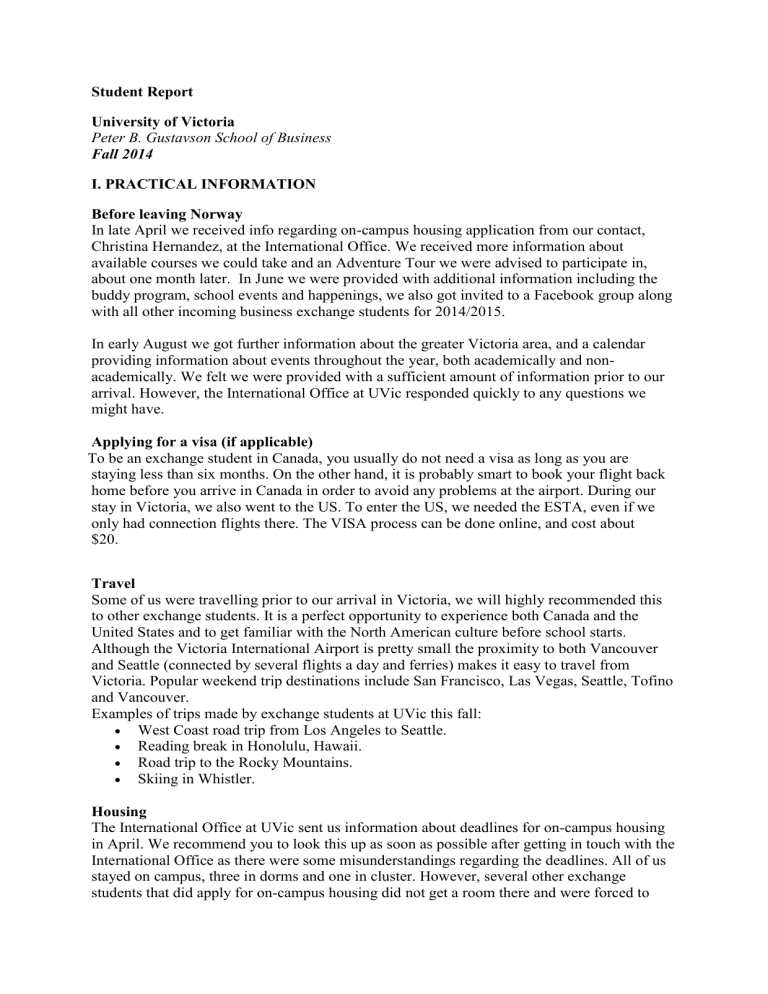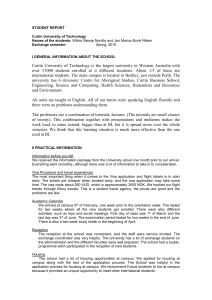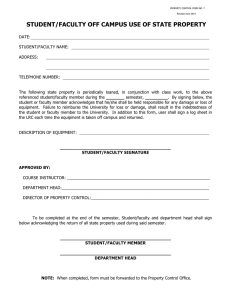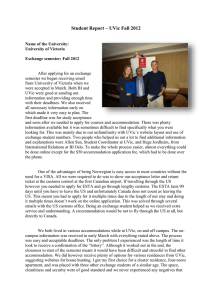Student Report University of Victoria I. PRACTICAL INFORMATION Before leaving Norway

Student Report
University of Victoria
Peter B. Gustavson School of Business
Fall 2014
I. PRACTICAL INFORMATION
Before leaving Norway
In late April we received info regarding on-campus housing application from our contact,
Christina Hernandez, at the International Office. We received more information about available courses we could take and an Adventure Tour we were advised to participate in, about one month later. In June we were provided with additional information including the buddy program, school events and happenings, we also got invited to a Facebook group along with all other incoming business exchange students for 2014/2015.
In early August we got further information about the greater Victoria area, and a calendar providing information about events throughout the year, both academically and nonacademically. We felt we were provided with a sufficient amount of information prior to our arrival. However, the International Office at UVic responded quickly to any questions we might have.
Applying for a visa (if applicable)
To be an exchange student in Canada, you usually do not need a visa as long as you are staying less than six months. On the other hand, it is probably smart to book your flight back home before you arrive in Canada in order to avoid any problems at the airport. During our stay in Victoria, we also went to the US. To enter the US, we needed the ESTA, even if we only had connection flights there. The VISA process can be done online, and cost about
$20.
Travel
Some of us were travelling prior to our arrival in Victoria, we will highly recommended this to other exchange students. It is a perfect opportunity to experience both Canada and the
United States and to get familiar with the North American culture before school starts.
Although the Victoria International Airport is pretty small the proximity to both Vancouver and Seattle (connected by several flights a day and ferries) makes it easy to travel from
Victoria. Popular weekend trip destinations include San Francisco, Las Vegas, Seattle, Tofino and Vancouver.
Examples of trips made by exchange students at UVic this fall:
West Coast road trip from Los Angeles to Seattle.
Reading break in Honolulu, Hawaii.
Road trip to the Rocky Mountains.
Skiing in Whistler.
Housing
The International Office at UVic sent us information about deadlines for on-campus housing in April. We recommend you to look this up as soon as possible after getting in touch with the
International Office as there were some misunderstandings regarding the deadlines. All of us stayed on campus, three in dorms and one in cluster. However, several other exchange students that did apply for on-campus housing did not get a room there and were forced to
search off-campus accommodation. They all recommended airbnb.com
as a great option to get in contact with landlords, the International Office were also helpful in connecting landlords and students.
Living on campus is a great advantage due to the proximity to the University, the gym and all other student services. We found that living in a cluster, sharing a small apartment with three other students was by far the best option. Living in a dorm can be noisy and tiresome as your neighbors are mostly seventeen/eighteen year old first year students in party mood. However, you can choose to live on a “quiet floor” with stricter rules towards music and noise.
Whether you were offered a room on campus or not, everyone applying for accommodation had to pay a $50 fee. Usually, the Residence Services has a rigid regime where you are not allowed to move into your room until 1 day prior to school start, and moving out no later than
24 hours after your last exam. However, all cases we experienced were solved in a reasonable matter after contacting them.
Costs
Approximately living costs:
Ingrid
Rent (on campus)
3500 NOK (monthly payment)
Books 1500 NOK (one time payment)
Food
Transport
Other
2500 NOK (monthly payment)
Bus transport was free (with student ID) during the fall of 2014
Phone: 150 NOK (monthly payment)
GYM: 350 NOK (one time payment)
Mikkel
Rent
Food
Transport
3500 NOK (monthly payment)
3000 NOK (monthly payment)
Other
Bus transport was free (with student ID) during the fall of
2014
Phone: 150 NOK (monthly payment)
GYM: 350 NOK (one time payment)
Erik
Rent
Books
Food
3500 NOK (monthly payment)
2500 NOK (one-time payment)
3000 NOK (monthly payment)
Transport Bus transport was free (with student ID) during the fall of
2014
Other Phone: 150 NOK (monthly payment)
GYM: 350 NOK (one time payment)
Culture and language
Our first experience with Canadians was highly related to their friendliness and the fact that
Canadians are very open minded.
We did not face any culture related problems during our semester abroad, however it takes some time getting used to talk English to everyone all the time. Although we did not face any problems we experienced some substantial differences. Canadians in general are way more kind, warm and welcoming than the average Norwegian. As an example we can mention that it is common to say “thank you” to the bus driver before you leave the bus. It is also common to ask, “how is it going?” every time you meet someone you know. As we quickly became aware of, a simple “I’m fine, and yourself?” is a proper respond and to do not lead to any awkward situations.
During our semester abroad we learned some Canadian norms and rules to use in everyday life, no one was problematic, but rather interesting and funny.
II. ABOUT THE SCHOOL
University of Victoria has some 20,000 students, divided into several faculties. The business faculty, or the Peter B. Gustavsson School of Business, receives each year approximately 180 incoming exchange students from all over the world. The campus is located within and around a circle shaped road, named Ring Road, surrounding the beautiful campus scenery.
Almost everyday we saw squirrels and deer’s walking around campus. Although the campus is enormous compared to Norwegian standards, the UVic campus is fairly small compared to nearby universities such as the University of British Columbia in Vancouver. All university services are located within a 10-minute walk from the Ring Road making it compact and practical.
There are few auditoriums and most lectures are held in smaller classrooms containing
15 to 60 people. The desks are a lot smaller than we were used to, but this works out well when you get used to it. The university buildings are of varying standards, from new and modern to older, more classical buildings. We found that every building has its own charm.
The fall of 2014 the new Mystic Market, a food court, opened in the University
Centre, providing 13 different dining opportunities varying from Italian and Thai food, to local favorites.
The University of Victoria also provides a long list of facilities to the delight of the students, including a cinema, a pub, a pharmacy, a dentist and a doctor, a security office open
24/7, a travel office, a bookstore, several sports fields and two major fitness centers. The fitness centers has squash courts, an indoor ice hockey field, swimming pools, indoors and outdoors tennis courts and the list goes on. In early 2015, the University of Victoria’s new pride, the CARSA (Center for Athletics, Recreation and Special Abilities) opens, providing a state of the art, world class training facility for students with all imaginable amenities.
Unfortunately we did not get the chance to test it.
The bus to downtown Victoria takes about 20 minutes, and the nearest grocery store is
5 minutes away by bus. The beach is also close to campus, only a 10-minute walk.
Course registration
The university sent us a list of courses, with course outlines, we could choose from. We were asked to list seven courses and send in the Learning Agreement to BI, who had to approve every course on the list. During the first orientation days we got the opportunity to add and drop, change and reschedule courses as we pleased. However, make sure BI approves every course you take. Unfortunately, we experienced that one of our chosen courses, International
Finance, were cancelled due to a sick professor. This was ultimately solved in a good way, as we got to take a similar course and both the International Office at UVic and BI were understanding and helpful in the process.
Academic calendar
Arrival date: Late August.
September 1, (Orientation days from August 28) First day of the semester:
Last day of classes: December 3.
Examination period: December 7.-22.
Reading Break: November 10.-12.
Any special events/holidays:
Other: Depending on your courses you might end up not having any exams.
Most lectures are held Monday to Thursday, so you might end up having the Friday free.
Arrival
We would recommend arriving a few days prior to the first orientation day so that you can take a look around, as the campus size tends to be a bit overwhelming the first days. However, there are maps and signs everywhere making it easier to get around in the beginning. Other students and staff are also really helpful and understanding and seem to love helping new students around campus.
During the introduction days, all of the exchange students were gathered in one of the auditoriums on campus. Here we met the people we had been in touch with before leaving
Norway. They informed us about courses, dining opportunities, other events during the semester, and campus in general. We also received a folder with a lot of relevant information, including a nametag, course schedule and other activities.
The first weekend most of the exchange students went on an Adventure Tour to Lake
Cowichan on Vancouver Island, here we got to know each other better and spent the days paddling, kayaking, hiking and water tubing. The last evening we also had a culture show were all students presented their home country.
After the first day of school, we had a barbecue with all of the exchange students. Our student cards were picked up during the first week. This card also works as a bus card in greater Victoria, and is free. We heard that this would be changed after January 1, 2015. so new students will have to pay for their bus cards separately. Unfortunately we do not know more about this change.
The International Office
The international Office, and Christina Hernandez, was really helpful and kind. If we had questions they were quick at responding, and if something was happening we always got information in good time.
Promoting BI and Norway
The school had an exchange forum in October with curious Canadian students gathering information about potential study opportunities. All exchange students had stands and promoted their schools and home countries.
Social activities
We got to know several Canadians through the buddy program and through in-class group works, but exchange students mainly hang out with each other as they usually have the same interest in discovering new places and get new experiences. The first few weeks there is a lot of events open for everyone so you will never get bored. Later, during the semester there is always a party to attend, or some other exchange students urging to experience something new and willing to do a weekend trip. In general, we found the student environment fantastic, especially among the international students.
There was also a buddy program, arranging several activities throughout the semester, giving you a good opportunity to experience Canadian culture with Canadian natives. Among other things we went to pub-crawls and, basketball games and an ice hockey game. All exchange students got their own buddy, which was a Canadian student. It was their job to take the exchange student out on different activities.
III. ACADEMICS
In the classroom
The lectures are very different from what we are used to at BI. Smaller classrooms, with fewer students give a more intimate atmosphere similar to what we were used to in high school. Participation also counts as part of your grade and every student is expected to participate, and by that we mean talk, in every class. In some courses all lectures are only based on discussions, and you are expected to have read all assigned material and come prepared to every class.
The workload is heavier in comparison to BI, mostly due to the fact that instead of having one final exam counting 100% of your grade, there are several assignments, presentations and mid-terms in every course spread throughout the semester. Unfortunately these assignments tends to bulk up and have the same due dates giving the students the responsibility to structured their work in order to get everything done in time. Although the academic level might seem lower in some courses, there is a lot to do so prioritizing is essential.
Course materials
The course materials very varying from online articles, lecturers power points and in-class material to regular text books, all depending on the course and subject. All courses expect some reading, some more than others.
Exams
University of Victoria offers a long list of courses; so final exams are not given in every course. We ended up having to final exams each, counting 35 and 40 percent. The professors
and the Dean are responsible for the exams, so information regarding the exams is provided at an early stage.
The final grade is typically based on class participation, attendance, assignments, presentations, video presentations, quizzes, mid-term exams, and sometimes a final exam. In the end it sums up and provides the professor an overview of your overall performance during the semester.
Library and technology
The library is located in the very heart of the Ring Road, and has a satisfactory amount of workspaces, group study rooms and computers. Several quiet areas give you the opportunity to study in peace. At the ground level, by the entrance is also the library cafe, which is the natural meeting point among students. Printing is available in the library or by the copy center in the Student Union Building.
There is also a Law library, located right outside the Ring Road, popular among students due to its quiet atmosphere and great study environment.
Description of courses
Please list below all the courses you took while on exchange. Your comments are useful for
BI and for future exchange students, include information on the academic level, challenges, relevance to your studies, if the course was practical/theoretical, any enrolment issues, etc.
Course code
& name
Master/ Bachelor Exam form
Prerequisites Approved as
Comments
COM 390
Canadian
Business
Environment
Bachelor/Master Final assignment
(40%)
None Elective Only offered for exchange students.
Easy course.
COM 400
Strategic
Management
Bachelor/Master Two midterms
(20% each)
None
IB 416
International
Marketing
Bachelor/Master Final assignment
(40%)
At least 1 marketing course.
Mandatory The course with the heaviest workload in the business program.
Online simulation.
Excellent professor.
Elective Very interesting with several guest lecturers from the marketing business.
COM 446
Investments
Bachelor/Master Final exam
(40%)
At least 1 finance course.
Mandatory Demanding course, difficult exam and mid-term.
Interesting.
IB 301
International
Business of
Environment
Bachelor Final assignment
(40%) and two midterms
(20% each)
None Elective Only in class discussions.
Very demanding with a lot of reading.
Expected to participate and contribute.
Excellent professor.
COM 410
Leadership
Strategies
Bachelor/Master Final assignment
30% and mid-term
40%
None Mandatory Watched three movies during the term, lots of class discussions,
COM 435
Corporate
Relations and
Responsibilitie s
Bachelor/Master Final assignment
30% and mid-term
40%
None Mandatory interesting group works.
Watched four movies during the term, class discussions related to this, interesting case studies.
We all agreed upon that we had a fantastic semester in Canada. Giving us memories and friends for life. We did not once regret taking the opportunity to go abroad with BI, and recommend every student to do the same. You learn so much about yourself, you get to experience a new culture, and you meet a lot of kind, friendly and very interesting people who think just the same about you. If you have any questions about our time abroad, Vancouver
Island or the University of Victoria in general, do not hesitate contacting us and we will be happy to help you as best we can.


